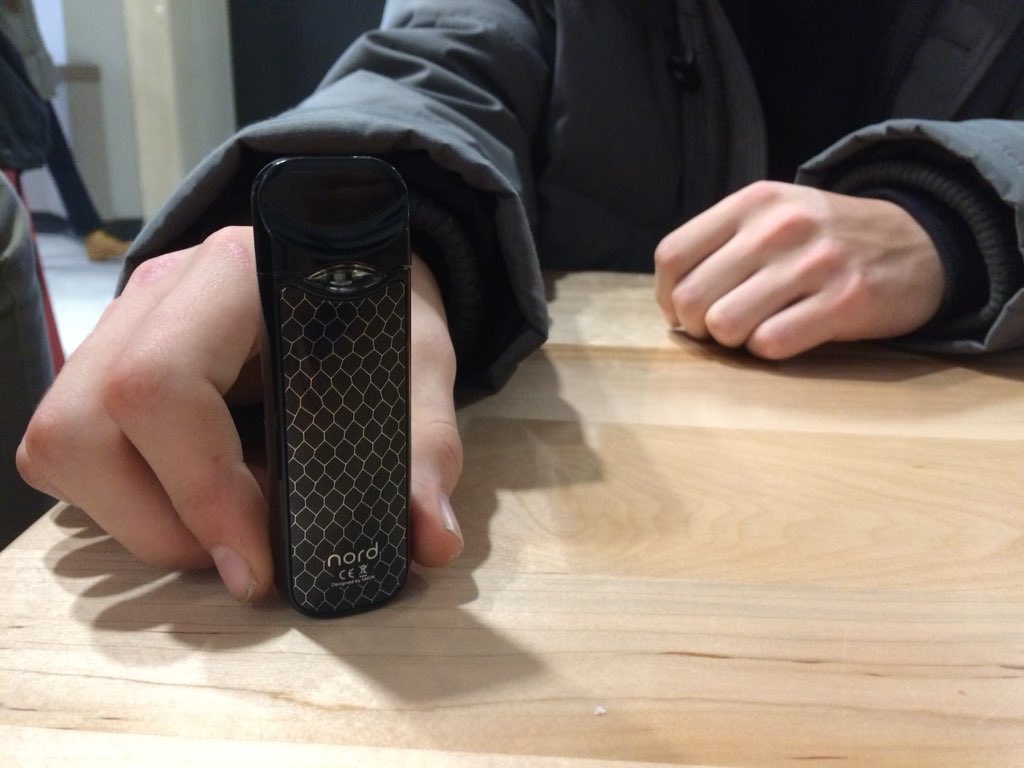Sitting inside a London coffee shop, a 14-year-old high school student puts a black Nord vape to his lips, inhales, and then does something he describes as “ghosting.”

It’s a “trick,” his friends say. And it’s how the blond-haired Grade 9 student says he can get away with vaping in the middle of class, and inside his school’s bathrooms and hallways — which is illegal under the Smoke-Free Ontario Act.
“Ghosting means you inhale it and it doesn’t come out, so I do that and no one notices because it’s kinda quiet,” he explained.
The teenager, sitting among a group of friends, didn’t want to be identified by name. He goes to one of the several secondary schools in downtown London, where he estimates three-quarters of his peers have tried vaping at least once and 30 per cent do it regularly.
According to the 2017 Ontario Student Drug Use and Health Survey, 11 per cent of students in Grades 7 to 12 said they’d used more than just a few puffs from an electronic cigarette, with or without nicotine, in the past year.
Canada-wide data, examining the same grade range, says 23-per cent of students reported trying a vaping product and 10-per cent had used them within the last 30 days.
- B.C. to ban drug use in all public places in major overhaul of decriminalization
- 3 women diagnosed with HIV after ‘vampire facials’ at unlicensed U.S. spa
- Solar eclipse eye damage: More than 160 cases reported in Ontario, Quebec
- ‘Super lice’ are becoming more resistant to chemical shampoos. What to use instead
E-cigarettes, also called vapes, are battery-operated devices that create a mist that the user inhales. The juice that goes inside the device’s tank can contain nicotine or cannabis, or just flavour.
“Within the marketplace, there’s greater than 8,000 flavours that an individual can choose from,” said Linda Stobo, the head of the Middlesex-London Health Unit’s Chronic Disease Prevention and Tobacco Control Team.
Marketed heavily as a way to help people quit smoking, Stobo says vapour products are safer than combustible cigarettes. But their increasing popularity among youth and young adults is concerning, because they still come with their own set of health risks.
Nicotine is extremely addictive, and — like cannabis — can negatively impact a young person whose brain isn’t fully developed, she explained.
“When they’re having this regular infusion of nicotine into their brain, what’s happening is it’s actually altering brain development, including altering development of parts of the brain that help people focus and learn and… parts of the brain that deal with control, and addiction control.”
Even if someone opts for juice that doesn’t include nicotine at all, Stobo said there are still chemicals in the flavours that aren’t supposed to be introduced to one’s lungs.
Health Canada is proposing new restrictions on advertising vaping products and e-cigarettes to minors, which haven’t been finalized yet. The regulations would restrict advertising where youth might see it, such as points of sale in brick-and-mortar stores and online, in public places, or on television or radio shows aimed at kids and youth.
Under the Smoke-Free Ontario Act, it’s illegal to sell or give vaping products and tobacco products to some under 19 years old.
The Middlesex-London Health Unit says it’s working with the 300 stores across London and Middlesex County that sell vapour products to enforce the law. But the 14-year-old said it’s “too easy,” to get a hold of the products anyways.
“I can go into stores and they don’t ID me,” he explained. There are several websites where you can “order whatever you want,” after responding to a pop-up question that asks whether you’re 19 or older, while other students have told the 2017 Ontario Student Drug Use and Health Survey they get vapour products from older siblings.
Christine Giannacopoulos, a superintendent with the Thames Valley District School Board, says students can get slapped with a $305 fine if they’re caught vaping on school property.
“Fines are issued by the officer of the provincial enforcement agency, so they come in, and if they do find people smoking or vaping or e-cigarettes on private property, then they do fine,” she said.
Giannacopoulos said the school board is working with its various public health agency partners to educate students about the risks of cannabis, tobacco and vaping.
“We all know the literature says vaping leads to nicotine addiction, and further addiction, so being proactive with respect to understanding the consequences of vaping is where we’d really like to start, and ensure the students know, moving forward, this isn’t a good habit to develop at a young age.”
But that message doesn’t seem to be landing with students who currently enjoy vaping on school property anyways.




Comments